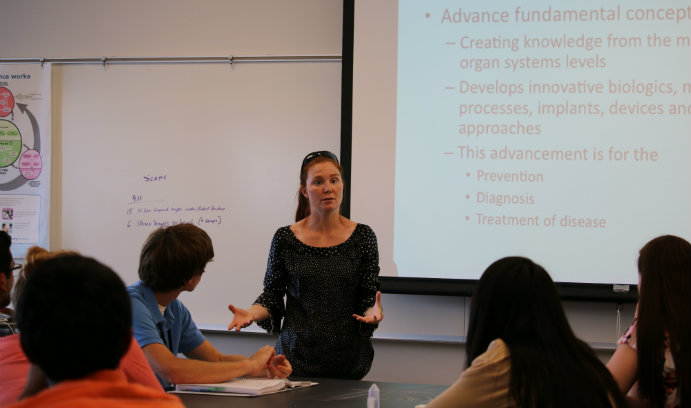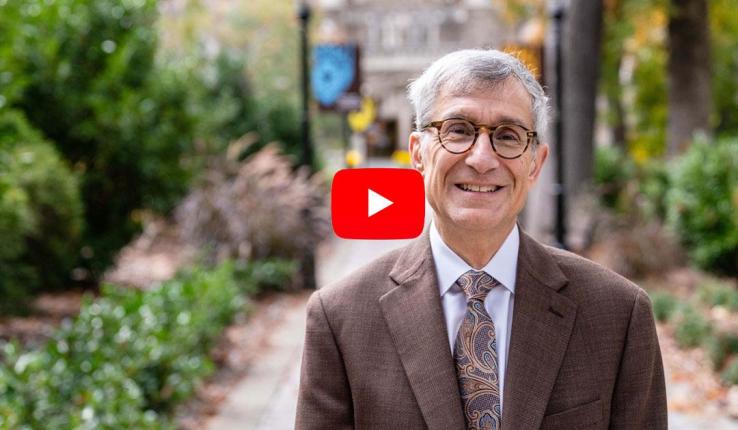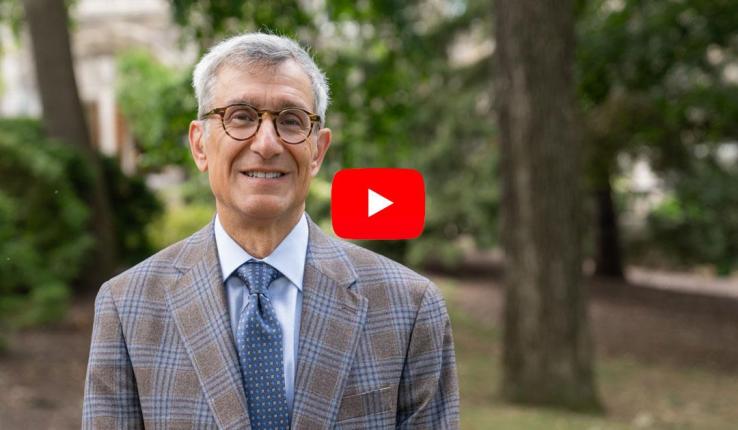Next steps in ADVANCE-ing gender equity

In 2010, Lehigh was one of seven recipients of a National Science Foundation (NSF) ADVANCE Institutional Transformation Grant. The five-year, $2.6 million grant aimed to increase the ranks of women in academic science and engineering careers.
Lehigh’s ADVANCE grant focused on harnessing the strengths of interdisciplinarity to enhance recruitment, retention and the advancement of women faculty in STEM fields at Lehigh. Though the active funding period will come to an end this summer, ADVANCE will continue its work to promote gender equity among faculty.
Toward this end, Lehigh applied for and was awarded a second ADVANCE grant. Lehigh will partner with Georgetown University, Bucknell University, Lafayette College and the United States Military Academy and will be joined by the United States Naval Academy on a project titled “Patriot League Institutions Mentor Associate Professors WISEly (MAPWISEly).” The goal of the project is to examine if emerging best practices for mentoring new women associate professors in STEM fields positively impact measures of career satisfaction and serve as indicators of advancement across a diverse network of Patriot League institutions. Kristen Jellison, associate professor of civil and environmental engineering and faculty director of Lehigh’s ADVANCE grant, also serves as a co-PI on the most recent grant.
At the time of the grant announcement, Jellison said: “Newly-tenured faculty represent a group of professors who are generally neglected in terms of mentoring. We have strong and active programs in place to mentor new assistant professors, but there is not much formal mentoring in place for new associate professors.”
She added: “The work of this new ADVANCE grant will focus on evaluating emerging best practices for mentoring new women associate professors in STEM with respect to their impact on career satisfaction, professional success and promotion.”
In another sign of the program’s momentum, the ADVANCE office will continue to be led by current program director Marci Levine.
“I look forward to collaborating with colleagues across campus in this next phase of our work and to learning from and sharing with other Patriot League institutions about ways to support leadership development for women STEM faculty,” said Levine.
Among the visible achievements of the ADVANCE office’s efforts was the hiring of 13 women faculty members for the fall semester of 2013, which was highlighted in the Women in Academia Report, a publication that monitors and reports trends concerning women in all areas of higher education.
Another indication of the program’s growth: a Men Advocates and Allies group formed this past September after a group of four previously trained Allies participated in a two-day workshop offered by faculty men Advocates from the Advance FORWARD program at North Dakota State University (NDSU). The goal of the workshop was to create a small group of men who would take on leadership responsibility at Lehigh acting as Advocates for gender equity in service to the overall goals of ADVANCE.
Why does Lehigh need an allies program?
According to the workshop materials:
“Problems related to gender inequity are typically associated with problems in the overall climate/culture of an organization. When an institution is dominated by one group, that particular group is often unaware of the ways in which the climate is set up to serve that group and create disadvantages for less dominant groups. Since Lehigh is a traditionally male-dominated institution, men can play an important role in creating a more accepting and equitable climate for women.”
“More and more men are seeing themselves as integral to gender equity,” said Levine.
Higher education is not alone in seeking to enlist men allies in efforts to create greater gender equity. Perhaps the most visible example is the United Nations’ “He for She” campaign which acknowledges that gender equity is “not just a women’s issue, it’s a human rights issue” and invites “people around the world to stand together to create a bold, visible force for gender equality.”
The core mission of the LU ADVANCE Men Advocates is “to seek to exert a positive influence, primarily among men, on the campus climate regarding gender equity and fairness at Lehigh University.”
One of the Advocates’ first tasks was to respond to a request from ADVANCE to explore the issue of possible gender bias in Lehigh’s standardized student course evaluation tool. A large body of social research has documented gendered evaluation processes in a variety of institutional settings, including the academic workplace. These processes systematically put women at a disadvantage when their performance is being rated. This phenomenon applied to higher education has been reported on by the news media in such publications as Inside Higher Ed and New York Magazine. Similar to other higher education institutions, student course evaluations at Lehigh play a significant role in the review of faculty for merit raises, re-appointment, tenure and promotion.
In January, Lehigh ADVANCE Men Advocates released a document entitled “Statement on Gender Bias in Student Course Evaluations” to university faculty, concluding:
“At Lehigh, global ratings of teaching effectiveness (questions 1, 2, and 14 on course evaluation summary reports) are the ratings usually employed in the review of current faculty and job candidates. Faculty conducting these reviews must be made aware of the likelihood that these ratings routinely advantage men and disadvantage women.”
The statement includes mention of a few studies documenting gender bias in a variety of institutional settings, including the academic workplace:
“…one study (Sprague and Massoni, 2005) shows that when students describe good men teachers, they use many descriptions (e.g., funny) that are different from the ones they use to describe good women teachers (e.g., nurturing). The teaching activities that prompt these gendered descriptions differ. As a result, women may have to engage in more time-demanding forms of pedagogy in order to garner the same global teaching ratings as men who teach according to conventional gender expectations.”
“In another study (MacNell et al., 2014), instructors in an online course presented themselves as both male and female to separate class sections, masking their true gender identities. The study concluded that ‘regardless of actual gender or performance, students rated the perceived female instructor significantly more harshly than the perceived male instructor.’”
Most recently, the Advocates turned their attention to creating a workshop much like the one they were given by their NDSU mentors. They offered two sessions—one on March 29, another on March 30—that addressed issues including Lehigh's climate, unconscious bias and strategies to promote gender equity. The goal was to train ADVANCE “allies.”
What do allies do?
According to the workshop materials, allies make themselves aware of unconscious and institutional biases; gain knowledge and education about the gender dynamics of their workplaces, staying up-to-date on gender bias research; build skills in communicating this awareness and knowledge to others; and, take action in a number of ways, including speaking up at meetings, collaborating with female colleagues and working to achieve balanced search pools.
“Developing and hosting the workshops was a first-time effort for the Advocates and proved generally successful,” said Augustine Ripa, professor in Lehigh’s Department of Theatre and current coordinator of the LU ADVANCE Advocates. “As the academic year comes to a close, the number of advocates and allies has grown substantially—fulfilling an early goal.”
Added Ripa: “The present generation of men on campus may have little natural reason to be introspective about Lehigh's history as a male formed and dominated institution. Many men find the climate is friendly. It is therefore important to take the time to think about the possibility that what we may take for granted isn't necessarily the experience of our women colleagues. And then we might ask ourselves how we all can work together to create an open and inclusive workplace.”
Posted on:




